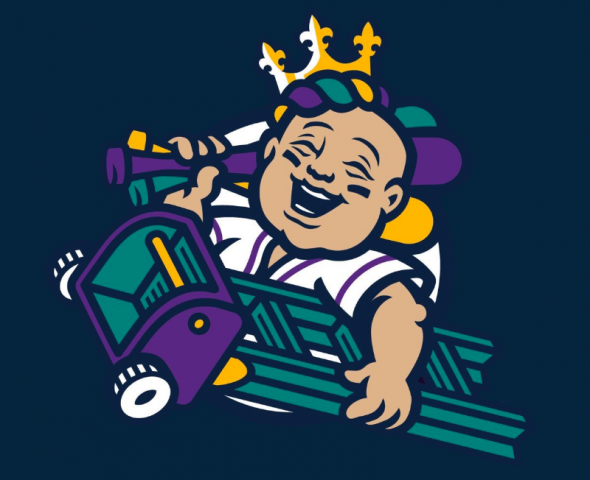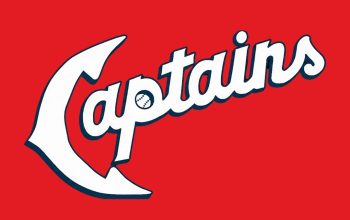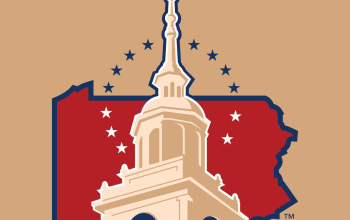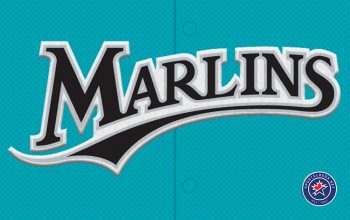It’s possible that the New Orleans Baby Cakes are the first team in sports whose logo is a cartoon representation of a plastic toy that many people think represents baby Jesus. Let me explain.
Until this season, the Baby Cakes franchise, Triple-A affiliate of the Miami Marlins, had been known as the New Orleans Zephyrs (ostensibly named for a famous roller coaster in New Orleans), who brought the name Zephyrs from Denver (where there was a famous passenger train by that name). The Zephyrs had an understated, classy logo, and therefore were getting drowned out of relevance in a sea of outrageous minor league baseball identities. (We covered the Zephyrs in this series here.)
So the team sought a new brand, one that would speak to the local community and get noticed by fans everywhere. The result is one of the most talked-about wacky new nicknames in a sport that basically is defined by its wacky nicknames. According to the team, though, the name is not just about shock value.
“We never once said, let’s come up with something crazy that will make people go nuts,” said Augusto “Cookie” Rojas, the team’s general manager. “It wasn’t our intent to be bizarre or exotic or way out there. It was basically our intent to craft something that was unique like New Orleans.” (Speaking of unique to New Orleans, notice how the crest on the right includes the logo of the early-1900s baseball team the New Orleans Pelicans, which saw the likes of Shoeless Joe Jackson, Dazzy Vance, and Earl Weaver in uniform.)
 The name Baby Cakes comes from a traditional delicacy called a king cake, which is essentially a sugary bread with purple, green, and yellow icing. The three colors represent royalty (purple), faith (green), and gold (yellow), as well as the biblical three kings who brought gifts to baby Jesus on the 12th day of Christmas. King cakes, which have come to be associated with Mardi Gras, traditionally have baked into them a small plastic baby, which to many represents baby Jesus.
The name Baby Cakes comes from a traditional delicacy called a king cake, which is essentially a sugary bread with purple, green, and yellow icing. The three colors represent royalty (purple), faith (green), and gold (yellow), as well as the biblical three kings who brought gifts to baby Jesus on the 12th day of Christmas. King cakes, which have come to be associated with Mardi Gras, traditionally have baked into them a small plastic baby, which to many represents baby Jesus.
In the original tradition of the king cake, which dates back hundreds of years to old Europe, it was a bean, pecan, or ring baked into the cake. The person who ended up with the slice of cake with the trinket in it was to be treated like a king for the next year.
The current tradition with the plastic baby began in New Orleans in the 1940s, where it was originally a porcelain baby. Nowadays, the person who gets the plastic baby Jesus is responsible for providing the cake at the following year’s celebration. Because king cakes were first associated with the 12th day of Christmas, also called the Epiphany or the feast of the three kings, many believe that the baby in the cake represents baby Jesus, though this is not universally accepted.

The colors found on the cake, and in all things Mardi Gras, really, are featured (kind of) in the Baby Cakes’ identity.
“Our colors are navy blue and gold—that dark, dark, dark navy blue, almost black looking. And then we sprinkled in our own Mardi Gras colors,” Rojas said. “It’s not the exact Mardi Gras colors; it’s our take on it.”
When you think of a minor league baseball team named for Mardi Gras, the possibilities seem endless, and all of them feel like they might end up a bit risquée. But the Baby Cakes take a different perspective on the holiday.
“Mardi Gras is more than what the rest of the world perceives it as,” Rojas said. “It’s not Bourbon Street. It’s about families getting together and celebrating that time of the year.
He continued, “When we came up with the name Baby Cakes, it’s really taking the whole king cake concept, flipping it on its ear, and focusing on the baby itself, and the cake…. Minor league baseball brings families and people together to have a good time, just like a king cake does.”
Of course, the name and the Brandiose-designed logos generated a reaction when they were announced this past offseason, much of it predictably negative, because that’s always how it goes with these outlandish rebrands.
“No one likes change. No one enthusiastically embraces change,” Rojas said. “When it came out, the response was crazy, there was anger, there was passion, and it stirred something in people.”
When fans were voting on a new nickname last season, Rojas went incognito and walked around the stadium listening to conversations. He would hear fans would say how they hoped the team wouldn’t go with that crazy Baby Cakes nickname, but when Rojas interjected to see which names they preferred, more often than not, they couldn’t even remember the other options.
This leads Rojas to proclaim the mantra of minor league baseball teams everywhere: “I’d rather be loved or hated, but never ignored.”
In a sport where teams like the El Paso Chihuahuas, Albuquerque Isotopes, and Richmond Flying Squirrels seem rooted in tradition because they’ve been around for more than a few years, it’s fair to wonder how far down this wacky path minor league baseball will go. Will there be a backlash against the wacky nicknames and a return to more conservative identities?
Rojas thinks the wacky nicknames are here to stay, because that’s what the game is about, and he’s glad to see the Baby Cakes contribute to it.
“I do see that we are part of that trajectory of really coming up with something that allows minor league baseball to keep its identity as fun and not taking itself overly serious,” he said.
To be sure, the Baby Cakes are named for a significant cultural tradition in a unique location—the fact that the logo is based on a plastic toy that may or may not represent baby Jesus makes this backstory one of the most interesting in a landscape where it’s harder every day to be noticed.













